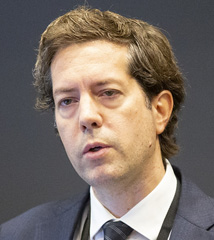

By Sean Maroongroge, MD, MBA, City of Hope National Medical Center

Acupuncture is an integrative medicine technique that utilizes needles to stimulate specific points on the body with the goal of improving health. There is a growing body of evidence that acupuncture can improve dysphagia from multiple sources including stroke and Parkinson’s disease. Although there exists significant heterogeneity in these trials (acupuncture points used, the number of treatments required, and outcomes and reporting standards), studies have generally suggested a beneficial effect, leading to acupuncture’s inclusion in several guidelines globally for use in post-stroke dysphagia.
While radiation is often the curative modality for patients with head and neck cancer, there is no doubt that some side effects of treatment can be severe and long lasting. Swallowing and related factors like taste and saliva production can be top of mind for many patients as they recover from treatment.1 This led investigators to ask the important question: can acupuncture reduce the severity of dysphagia experienced by patients undergoing head and neck radiation?
Pierluigi Bonomo, MD, and colleagues reported the results of their trial which randomized 91 patients undergoing definitive chemoradiation therapy to standard of care swallowing-sparing IMRT with or without acupuncture. The acupuncture intervention included a protocol of 11 weekly sessions from two weeks before radiation to two weeks after radiation as designed by the board-certified acupuncturists involved in the trial. The primary endpoint was dysphagia as measured by the MDADI composite score two weeks after radiation. Although there was no significant difference in grade 2+ dysphagia (53% vs. 47%, p<0.87) or mean MDADI composite scores (72.9 (SD 19.7) vs. 67.2 (SD 17.6) in the acupuncture and control arms respectively), there was a significant difference in the MDADI subscales and MDADI global score. The percent of patients who reported their swallowing did not impact their day-to-day life was 56.3% in the acupuncture arm vs. 29.7% (p=0.023) in the control arm.
A distinct group previously reported on a similar feasibility study which randomized 42 patients to active vs. sham acupuncture in 2016.2 There was no significant improvement seen in that study for active acupuncture over sham acupuncture, though with smaller patient numbers the statistical power was notably lacking.
So what can we conclude from this study? Dr. Bonomo summarized: “Acupuncture was extremely well tolerated, without any sign of unexpected toxicity on top of what is usually seen with concomitant chemo-radiation. Although the trial did not reach its primary endpoint, the mean composite MDADI score in the control arm outperformed the historical data on which the statistical assumption was based upon, and several health-related quality of life outcomes (secondary endpoints) in the domain of patient-reported swallowing and dry mouth favored the experimental arm. These results should be viewed as hypothesis-generating: combined with consolidated knowledge from previous data in the same disease setting that highlighted how acupuncture may have a protective role on chronic xerostomia and soft tissue fibrosis, a multifactorial mitigating effect may be suggested, potentially through neuro-modulatory effects.”
As for next steps, the authors note that “over the last years, several strategies have been put in place to deal with dysphagia in head and neck cancer, such as swallowing-sparing IMRT (DARS trial), optimization through protons, prophylactic swallowing exercises, preventive use of PEG, etc. Since none of these strategies can be viewed as a single solution, we believe that our study results should warrant future investigations in the field leading to a combination of acupuncture with other proactive strategies to prevent severe dysphagia. Clearly, mechanistic studies and ideally translational evidence could better elucidate the role of acupuncture in relation to radiotherapy. Further studies are needed to confirm the relevance of our findings.”
Ultimately, acupuncture is a non-pharmacologic intervention that may offer patients undergoing head and neck radiation relief from dysphagia, among other symptoms. Further exploration of standardized protocols may shed further light on optimal techniques, dose and timing to best serve patients. In the meantime, acupuncture in the hands of experienced providers should be considered a promising adjunct to radiation therapy that warrants further evaluation.
Abstract 145, Acupuncture for (Chemo)Radiotherapy – Related Dysphagia in Patients with Head and Neck Squamous Cell Carcinoma (HNSCC): A Randomized Phase 2 Study, was presented during the SS 08 - H&N 3: Addressing High-Risk Challenges Head On: Mitigating Toxicity and Reducing Recurrences session at ASTRO’s 66th Annual Meeting.